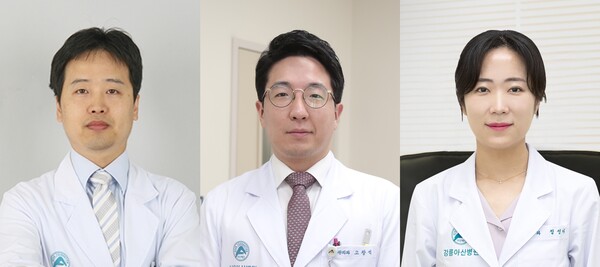As Korea grapples with an aging population, gastric cancer is becoming a huge concern as it remains the fourth most common cancer in the country.

A significant portion of gastric cancer cases are diagnosed in older adult patients, with recent statistics from the National Health Insurance Service revealing that over a quarter of gastric cancer patients in 2020 were aged 75 and above.
However, when diagnosed with advanced gastric cancer at an advanced age, there are costs about the cost of treatment or postoperative complications.
To put such patient's minds at ease, a research team, led by Professors Gong Chung-sik and Ko Chang-seok of the Department of Gastrointestinal Surgery at Asan Medical Center, and Jeong Seong-A Department of Surgery at Gangneung Asan Hospital conducted a study to shed light on the long-term survival factors for older adult patients undergoing surgery for advanced gastric cancer.
The study focused on patients aged 75 and older who underwent surgery for stage 2 or 3 gastric cancer and followed 237 patients over an average period of 71 months.
The results showed that there were no surgical mortality cases among these patients, and the three-month postoperative survival rate stood at an impressive 99.2 percent.
However, the five-year survival rate for these older adult patients with advanced gastric cancer was 51.4 percent, compared to the general five-year survival rates of 70 percent for stage 2 and about 40 percent for stage 3 gastric cancer.
The study's statistical analysis identified weight, complications, cancer stage, and the extent of gastric resection as significant factors influencing long-term survival.
The detailed analysis revealed that underweight patients had a 1.45 times higher risk of mortality compared to normal or overweight patients.
Patients with complications faced a 2.07 times higher risk, and those with stage 3 cancer had a 2.61 times higher risk compared to stage 2 patients.
Also, patients who underwent total gastrectomy had a 1.57 times higher mortality risk than those who underwent partial gastrectomy.
"For patients diagnosed with advanced gastric cancer, a comprehensive assessment of the patient's overall health, cancer stage, and the extent of gastric resection is crucial in deciding whether to proceed with surgery," Professor Ko said. "Focusing on improving nutritional status and minimizing postoperative complications can ensure safe treatment."
Professor Gong also highlighted the challenges in treating older adult patients, who often juggle multiple medications and may hesitate to undergo treatment due to their advanced age.
"At AMC, we tailor our treatment plans considering the overall condition of older adult patients, and we leverage our extensive experience in performing gastric cancer surgeries to provide safe and effective treatment," Gong said. "We hope our older adult patients won't forgo treatment solely because of their age."
The results of the research were published in Aging Clinical and Experimental Research.

